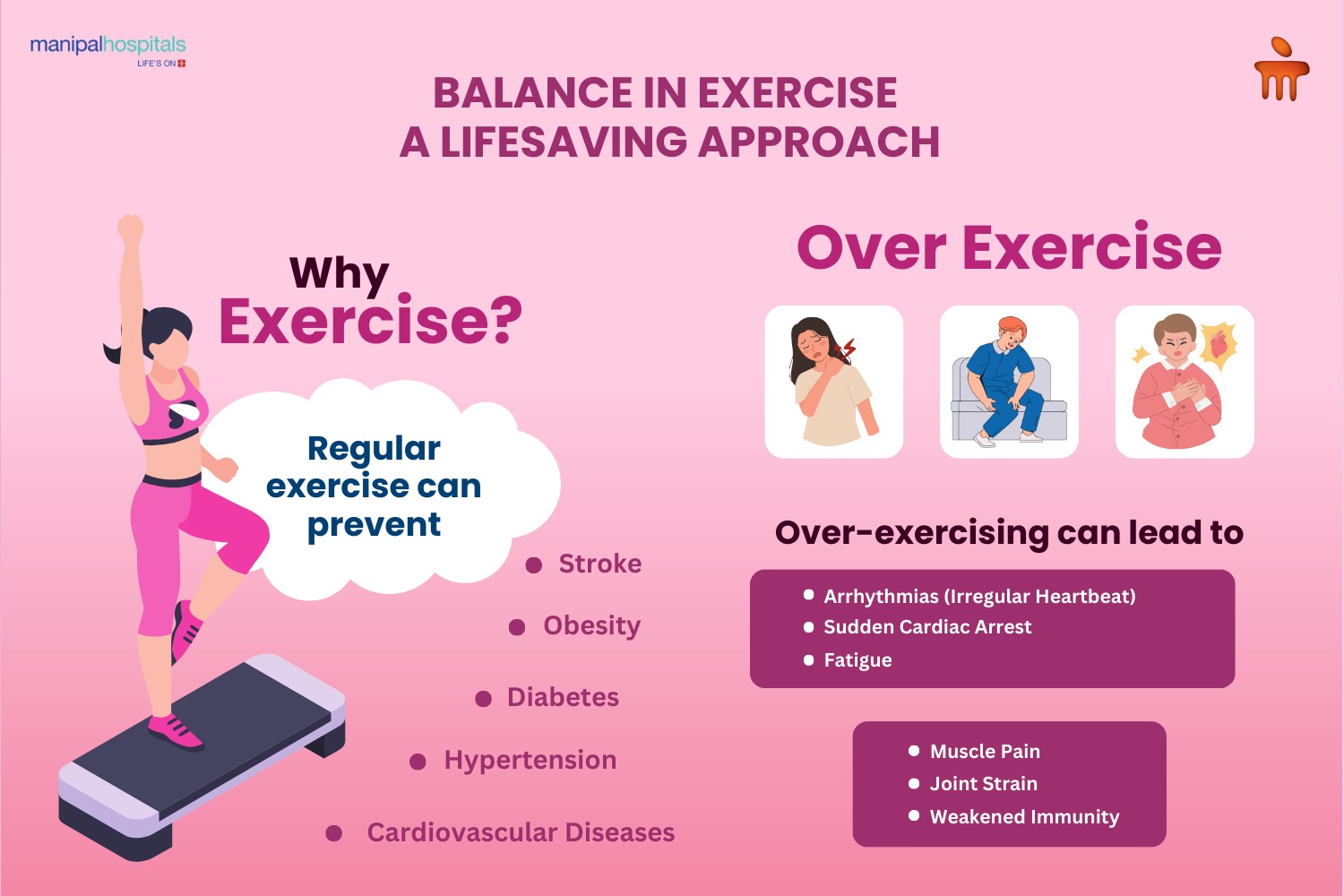
Whenever we think of exercise, we freak out! It is always about the difficulty of committing to the same. It is always about feeling scared of its extremities. However, if you want to maintain a healthy lifestyle, exercising is a must. On the contrary, nothing should be overdone. Why should exercising be any different, then? Top cardiologists in Bangalore highlight how cardiovascular exercise is crucial for preventing heart disease and promoting overall well-being. Here, we will also find how over-exercising or exercising with pre-existing heart diseases can be life-threatening. It is all about striking a balance.
Synopsis
What is Cardiovascular Exercise?
Cardiovascular exercise, also called cardio, is any form of physical activity that increases your heart rate and breathing. An ideal heart rate during rest would be 60-100 beats per minute (lower is better). When performing heart-healthy exercises, your target heart rate should be 50-70% of max heart rate (moderate-intensity) and 70-85% of max heart rate (vigorous-intensity). Heart healthy workouts involve using large muscle groups in a repetitive, rhythmic way, which improves the efficiency of your heart, lungs, and circulatory system.
Why Exercise is Important for Heart Health?
It is no surprise that regular heart healthy workouts can help us in many ways. It can improve our cardiovascular health, boost our immunity, and even reduce the risk of chronic diseases like hypertension, diabetes, and obesity.
The 5 best exercises to strengthen the heart include activities such as Walking, Running, Cycling, Swimming, and High-Intensity Interval Training (HIIT). HIIT, a type of cardiovascular exercise, alternates short bursts of intense workouts with short recovery periods. It's considered to be a time-efficient way to improve cardiovascular health. These heart healthy workouts can strengthen the heart muscles, improve blood circulation, and lower cholesterol levels in heart patients.
Besides, as we are all aware, exercising allows you to enjoy a healthy weight. This part is again related to reducing the risk of heart disease. Our body has a natural way of relieving stress with the help of the endorphin hormone. Being physically active means your body releases this hormone to better your mental health.
Consult our cardiology hospital in Old Airport Road if you need to know more about the best exercises to strengthen your heart
The Risks of Over-Exercising

Physical activity is healthy as long as it is done to an extent so as not to injure the person, especially those with heart issues. Excessive exercise results in heart problems such as arrhythmias, cardiomyopathy, and sudden cardiac arrest. Often, individuals may not realize that their exercise regime is causing them harm, especially if they have pre-existing medical conditions.
Over-training may also result in muscle/joint pains and strain, tiredness, loss of appetite, and a compromised immune system. These risks make it even more critical to seek the opinion of a top doctor, particularly if you are planning to ramp up your workouts.
Guidelines for Healthy Heart Workouts
Despite the risks, moderate exercise is one of the best ways to prevent heart disease. The key is to remain consistent and avoid a sedentary lifestyle. Start with simple heart healthy activities. For example, taking the stairs, gardening, or even doing household chores. Everything will count towards your weekly exercise goal.
Similar to a systematic investment plan or SIP, fitness regimes can be considered “Systematic Exercise Planning” or SEP, which follows the methodology of building endurance in a systematic manner through regular workouts. So, let us check out the recommended guidelines to integrate a safe exercise regime into your day. Here is a weekly target for most adults as suggested by the American Heart Association:
-
At least 150 minutes of moderate-intensity aerobic activity, or
-
75 minutes of vigorous-intensity aerobic activity each week.
You can combine this regime with muscle-strengthening activities twice a week. If you are diagnosed with certain heart conditions, you must work closely with a cardiologist. Consulting the best doctor will ensure that you have a personalized exercise plan that is both safe and effective.
Recognizing the Warning Signs of Heart Disease
Medical specialists advise that listening to your body and recognizing warning signs is crucial. Be cautious of the following symptoms:
-
Dizziness
-
Irregular heartbeat
-
Fatigue during or after exercise
These signs often signal an underlying heart issue. Stay highly alert if you have a family history of heart disease. You will need to undergo regular health screenings and check-ups with the top cardiologist in Bangalore.
To Sum Up
Cardiovascular exercise can both save and harm lives, depending on how it’s approached. This is a reminder to all of you to exercise safely and in moderation. The benefits of regular heart-healthy activity far outweigh the risks. Despite that, caution should always be taken. Consult with a fitness expert or cardiologist to create a detailed exercise plan to strengthen the heart.
FAQ's
Exercising beyond your physical capacity, especially without proper rest, can be harmful. Symptoms like persistent fatigue, muscle soreness, or irregular heartbeat indicate that you may be over-exercising. Consult a doctor to set safe limits.
Yes, individuals with heart disease can exercise safely under medical supervision. It’s important to work with a cardiologist to develop a personalised cardiovascular exercise plan that considers your heart condition and fitness level.
If you experience chest pain, dizziness, shortness of breath, or an irregular heartbeat during exercise, stop immediately and consult a healthcare provider. These symptoms could indicate serious heart issues.





















 5 Min Read
5 Min Read
















